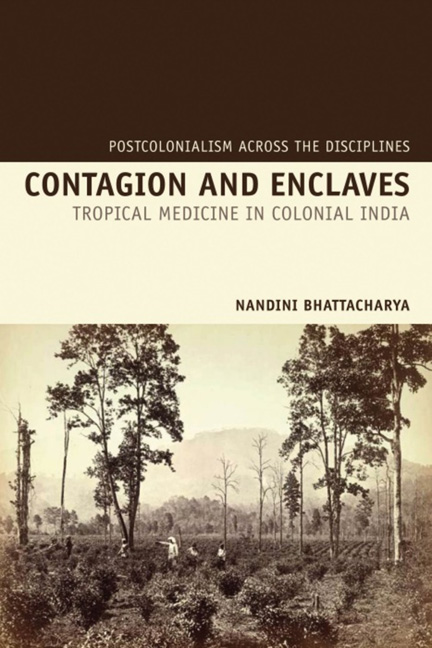Book contents
- Frontmatter
- Dedication
- Contents
- List of Illustrations
- List of Tables
- Acknowledgements
- List of Abbreviations
- 1 Disease and Colonial Enclaves
- 2 The Sanatorium of Darjeeling: European Health in a Tropical Enclave
- 3 Pioneering Years in Plantation and Medicine in Darjeeling, Terai and Duars
- 4 The Sanatorium Enclave: Climate and Class in Colonial Darjeeling
- 5 Contending Visions of Health Care in the Plantation Enclaves
- 6 The Plantation Enclave, the Colonial State and Labour Health Care
- 7 Tropical Medicine in Its ‘Field’: Malaria, Hookworm and the Rhetoric of the ‘Local’
- 8 Habitation and Health in Colonial Enclaves: The Hill-station and the Tea Plantations
- Bibliography
- Index
2 - The Sanatorium of Darjeeling: European Health in a Tropical Enclave
- Frontmatter
- Dedication
- Contents
- List of Illustrations
- List of Tables
- Acknowledgements
- List of Abbreviations
- 1 Disease and Colonial Enclaves
- 2 The Sanatorium of Darjeeling: European Health in a Tropical Enclave
- 3 Pioneering Years in Plantation and Medicine in Darjeeling, Terai and Duars
- 4 The Sanatorium Enclave: Climate and Class in Colonial Darjeeling
- 5 Contending Visions of Health Care in the Plantation Enclaves
- 6 The Plantation Enclave, the Colonial State and Labour Health Care
- 7 Tropical Medicine in Its ‘Field’: Malaria, Hookworm and the Rhetoric of the ‘Local’
- 8 Habitation and Health in Colonial Enclaves: The Hill-station and the Tea Plantations
- Bibliography
- Index
Summary
There were many ideological, political, military and medical reasons for hillstations in tropical colonies. The urgency of the question of the Europeans’ long-term survival in the tropics engaged medical discourses in Britain as well as in the tropical colonies in the seventeenth and eighteenth centuries. The eighteenth century represented a period of optimism about acclimatization and it had been generally a period when racial categorizations had not assumed absolute rigidity. By the third decade of the nineteenth century acclimatization theories were eclipsed and there were serious doubts about the survival of the Englishman in India over a few generations. The contrast between the diseaseridden, crowded, unsanitary plains and the pure and healthy air of the ‘hills’ therefore came to be a familiar trope of official as well as medical discourses in colonial India. The hill-stations provided one means of establishing comfortable, familiar surroundings for the British in the tropics: their climate was supposedly not tropical. The logic of the development of hill-stations was their climatic opposition to the plains. The hill-station was a uniquely colonial phenomenon, and although best known in India, was institutionalized in many tropical colonies. The British built hill-stations in Asia in the Ceylon and the Malay Straits – in fact the earliest ‘hill-station’ was at Penang in Malaya, which was occupied by the English East India Company (EEIC) in 1786 and by the early 1800s served as a site for recuperation for civil and military officials. In late nineteenth- and early twentieth-century Africa, social segregation followed closely on the heels of sanitation in the British colonies, and hill-stations facilitated the creation of exclusive, clean and secure social space for white Europeans.
Empire in the Tropics, Recess in the ‘Hills’: The Hill–Plains Dichotomy in Colonial India
Historians of colonial India have seen the establishment, evolution and historical trajectory of hill-stations as determined by racial distinctions and a value system which favoured the hills over the plains. The explorations in the Himalayas, the slow but sure penetration of British influence in the areas bordering the mountains on the north, north-east and the north-west of India took place in the first two decades of the nineteenth century. As Kennedy has pointed out, the nomenclature was deceptive.
- Type
- Chapter
- Information
- Contagion and EnclavesTropical Medicine in Colonial India, pp. 18 - 52Publisher: Liverpool University PressPrint publication year: 2012



